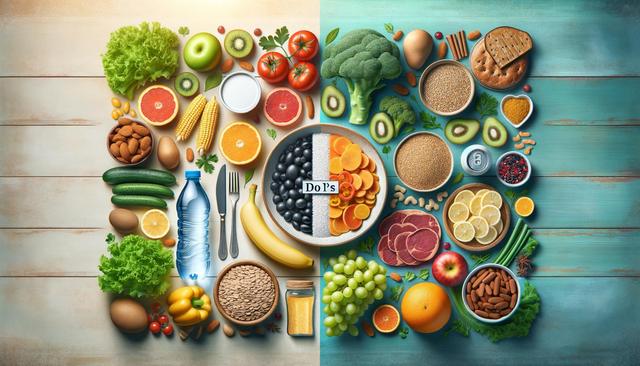Navigating Nutrition: What People with Kidney Disease Should and Shouldn’t Eat
Managing kidney disease starts with understanding which foods support kidney function and which may cause harm.

Understanding the Role of the Kidneys and Nutrition
The kidneys are vital organs responsible for filtering waste products, balancing fluids, and regulating electrolytes in the body. When kidney function declines, it becomes essential to adjust dietary habits to reduce the strain on these organs and prevent further damage. People with kidney disease often need to monitor their intake of certain nutrients including sodium, potassium, phosphorus, and protein. A tailored diet can help reduce symptoms, improve quality of life, and slow the progression of the disease.
Proper nutrition not only supports kidney health but also helps manage associated conditions like high blood pressure or diabetes, which can further impact kidney function. Working with a healthcare provider or a renal dietitian is strongly recommended, as nutritional needs vary depending on the stage of kidney disease and whether the individual is undergoing dialysis.
Foods to Avoid: Protecting the Kidneys from Stress
There are several types of foods that those with kidney disease should limit or avoid to prevent additional strain on the kidneys. High-sodium items are particularly harmful because they can increase blood pressure and cause fluid retention, both of which are detrimental when kidney function is compromised.
Common foods to avoid include:
- Processed meats such as bacon, sausage, and deli slices
- Canned soups and vegetables with added salt
- Snack foods like chips, salted nuts, and crackers
- Pickled or brined items
- Fast food and restaurant meals high in sodium and fat
In addition to sodium, foods high in phosphorus and potassium should be eaten in moderation. These include dairy products, bananas, oranges, potatoes, and whole grains. For those with advanced kidney disease, excessive intake of these minerals can lead to dangerous imbalances in the body.
Recommended Foods for Kidney Health
While dietary restrictions can feel limiting, there are many nutrient-rich foods that are more kidney-friendly and safe to enjoy in moderation. The key is to choose foods that are low in sodium, phosphorus, and potassium, and to control portion sizes to manage protein intake.
Some kidney-friendly foods include:
- Apples, berries, and grapes
- Cauliflower, cabbage, and bell peppers
- White rice, pasta, and refined grains in controlled amounts
- Egg whites and lean cuts of meat (in moderation)
- Unsalted popcorn and rice cakes as low-sodium snacks
Staying hydrated is also important, but fluid intake may need to be limited depending on the stage of kidney disease. Water remains the healthiest choice, and sugary or caffeinated drinks should be minimized.
Protein: Finding the Right Balance
Protein is a crucial nutrient for building and repairing tissues. However, in people with kidney disease, excessive protein intake can increase the burden on the kidneys. Conversely, too little protein may lead to muscle loss and malnutrition. Striking the right balance is essential.
For early-stage kidney disease, reducing protein intake slightly may help preserve kidney function. In later stages, especially for those on dialysis, protein needs may actually increase to compensate for losses during treatment. Types of protein to consider include:
- High-quality options like egg whites and fish
- Plant-based proteins such as tofu or low-potassium legumes (in moderation)
- Limiting red meat and high-fat dairy products
Consulting with a healthcare provider can help determine the optimal amount of protein needed based on individual health status and treatment plans.
Smart Meal Planning and Ongoing Management
Managing kidney disease effectively through diet requires thoughtful planning and consistent monitoring. Reading food labels, preparing meals at home, and keeping track of daily nutrient intake can make a significant difference. Using tools like food diaries or nutrition apps can help individuals stay within prescribed limits for sodium, potassium, phosphorus, and protein.
Helpful strategies include:
- Choosing fresh ingredients over pre-packaged or processed foods
- Using herbs and spices instead of salt for flavor
- Cooking methods such as grilling, baking, or steaming rather than frying
- Being cautious with portion sizes to avoid overconsumption
Ongoing communication with healthcare providers ensures that dietary needs are adjusted based on any changes in kidney function or overall health. Regular blood tests can help monitor levels of key nutrients and guide necessary modifications.
Conclusion: Supporting Kidney Function Through Informed Choices
For individuals living with kidney disease, making informed dietary choices is a critical part of managing the condition and maintaining overall well-being. While there are several foods to limit or avoid, there remains a wide variety of delicious and nourishing options that support kidney health. By understanding which nutrients need to be monitored and adopting kidney-friendly habits, those affected can take an active role in their health journey. Partnering with healthcare professionals ensures that dietary decisions are personalized, safe, and effective in slowing the progression of kidney disease.